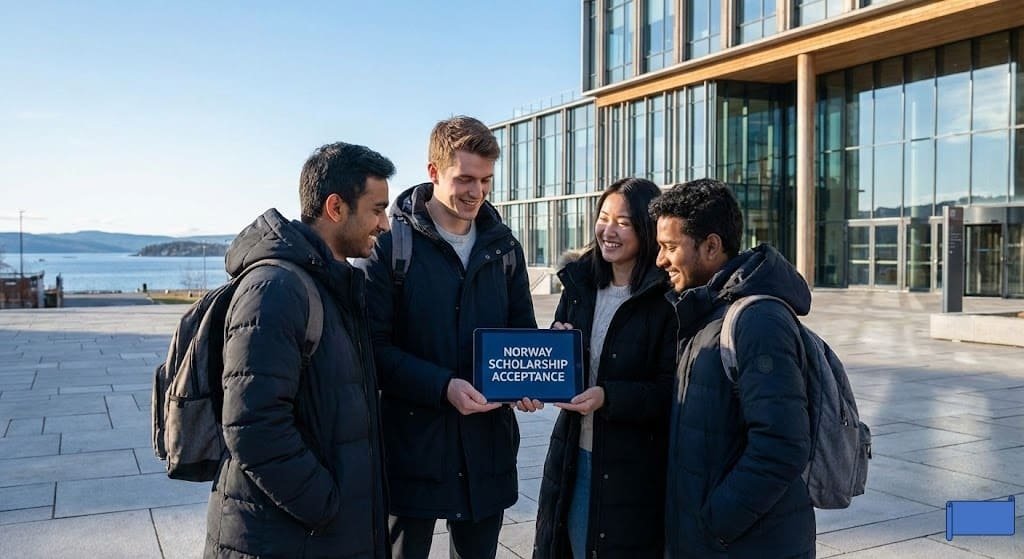Searching for scholarships in Norway in 2026? This extensive guide breaks down everything you need to know about studying in Norway with full or partial funding.

Apply for More Fully Funded Scholarships Here.
Known for its world-class education system, strong academic reputation, and tuition-free universities, Norway remains one of the top European destinations for international students in 2026.
1. Why Study in Norway in 2026?
Norway continues to attract thousands of international students for several reasons:
- Public universities charge no tuition fees for local and international students.
- Norwegian institutions rank among Europe’s best for research, innovation, and quality teaching.
- Degrees are recognized globally.
- It is one of the world’s safest and most developed countries.
- Students can work part-time while studying.
- Norway offers excellent living standards, modern infrastructure, and a peaceful environment.
In 2026, Norway is expanding its scholarship programs, especially for master’s, PhD, and research-level students.
2. Overview of Scholarships in Norway 2026
While tuition is free at public institutions, international students can still apply for scholarships that support:
- Living expenses
- Accommodation
- Travel grants
- Research costs
- Books and materials
- Insurance
The scholarships in Norway are primarily funded by:
- The Norwegian government
- Public universities
- Research organizations
- Private foundations
- International partnerships
These opportunities are available for bachelor’s, master’s, PhD, and exchange programs.
join the whatsapp channel for latest scholarships
McGill University Scholarships for National and International Students in Canada
3. Types of Scholarships in Norway Available
✔ Fully Funded Scholarships
These provide comprehensive financial support, often including:
- Housing allowance
- Monthly stipend
- Travel support
- Health insurance
- Research funding
✔ Partially Funded Scholarships
These may cover:
- A portion of living costs
- Semesters stipends
- Accommodation subsidies
✔ Tuition-Free University Benefit
Norway’s tuition-free system at public universities acts as a major financial advantage.
✔ Research & Doctoral Funding
PhD scholarships are usually paid employment contracts that provide:
- Full salary
- Research budgets
- Free tuition
4. Top Fully Funded Scholarships in Norway 2026
Here are the most competitive opportunities for the 2026 intake:
1. Erasmus Mundus Scholarships
Many joint master’s programs include study periods at Norwegian universities.
Benefits:
- Fully funded program
- Monthly stipend (~€1,100)
- Travel allowance
- Installation grant
2. BI Norwegian Business School Scholarships
Since BI charges tuition, it offers generous scholarships to attract international students.
Programs include:
- BI Presidential Scholarship
- MSc International Scholarship
- Women in Finance and Tech Scholarship
Coverage:
- Full/partial tuition
- Some scholarships offer stipends
3. University of Oslo (UiO) Funding
UiO provides:
- Master’s scholarships
- Fully funded PhD fellowships
Benefits include:
- Tuition-free education
- PhD salaries of about NOK 480,000–500,000 annually
4. Norwegian University of Science and Technology (NTNU)
NTNU is Norway’s top science and engineering institution.
Scholarships:
- Master’s awards
- Fully funded PhD fellowships
5. University of Bergen Scholarships
Available for:
- Master’s degrees
- PhD research roles
- Exchange programs
6. Nord University Scholarships
Popular fields:
- Biosciences
- Environmental studies
- Business programs
- Gaming and animation
5. Norwegian Government Scholarships
Although the previous “Quota Scheme” ended, several government-supported programs still exist:
✔ Norwegian State Educational Support
Available through collaboration with partner countries.
✔ NORPART Funding
Supports:
- Mobility programs
- Exchange semesters
- Joint study projects
✔ High North Fellowship
For students from:
- Japan, Russia, USA, South Korea, Canada
Includes:
- Monthly stipend
- Travel support
✔ Erasmus+ Programs
Students from Europe can study in Norway under exchange agreements.
Join the “USA Scholarship Network” Facebook group
Fully Funded Knight-Hennessy Scholars Program at Stanford University
6. University-Specific Scholarships
University of Oslo (UiO)
Offers:
- Master’s scholarships
- Research funding
- Fully paid PhD positions
NTNU
Known for:
- Engineering
- Technology
- Science
Funding includes:
- PhD salaries
- Postdoc research grants
University of Bergen
Offers merit-based awards for select master’s programs.
OsloMet
Focuses on:
- Research fellowships
- Specific master’s awards
NHH Norwegian School of Economics
Provides master’s-level scholarships for top-performing students.
BI Norwegian Business School
Offers one of the largest ranges of scholarship programs in Norway.
7. Popular Study Programs for International Students
In-demand programs include:
- Machine Learning
- Data Science
- Renewable Energy
- Marine Biology
- Cybersecurity
- Engineering fields
- Finance and Business
- Public Health
- Environmental Science
- Social Sciences
These programs attract strong scholarship competition.
8. Tuition-Free Education in Norway
One of Norway’s biggest attractions is its tuition-free education system at public institutions. This applies to:
- Bachelor’s programs
- Master’s degrees
- PhD programs
Students only pay a semester fee of NOK 500–800 (USD 50–90). This makes Norway one of the most affordable European destinations despite its high living costs.

KU Leuven Master Mind Scholarship in Belgium for International Students
<pStudy in Norway – Scholarships for Degree Students
>
9. Living Costs in Norway—How Scholarships Help
Norway is known for higher living expenses. Here is an estimate:
| Expense | Cost (NOK) | Approx. USD |
|---|---|---|
| Housing | 4,000–6,000 | $380–$550 |
| Food | 3,000 | $280 |
| Local Transport | 600 | $55 |
| Utilities | 900 | $85 |
| Miscellaneous | 1,500 | $140 |
Total: NOK 9,000–11,000/month ($850–$1,050)
Many scholarships cover these expenses either fully or partially.
Join USA and Canada Scholarships & Fellowships Facebook Group for more updates
10. Eligibility Requirements
General requirements include:
- Strong academic performance
- English proficiency (IELTS/TOEFL)
- A well-written motivation letter
- Admission to a Norwegian institution
- Valid passport
- Recommendation letters
For PhD applicants:
- Master’s degree in a relevant field
- Research plan
- Possible publications
Join Scholarships in Australia Facebook group for more scholarship and Fellowship updates
Fully Funded Turkish Government Scholarships for International Students
11. Documents Required
Common documents:
- Academic transcripts
- Degree certificates
- English test results
- Curriculum vitae (CV)
- Statement of purpose
- Letters of recommendation
- Passport copy
- Research proposal (for research-based degrees)
12. How to Apply for Scholarships in Norway 2026
Step 1 – Select Your University
Popular options:
- UiO
- NTNU
- University of Bergen
- Nord University
- OsloMet
- BI Business School
Step 2 – Review Eligibility
Check language and academic criteria.
Step 3 – Gather Documents
Prepare all required materials early.
Step 4 – Apply for Admission
Most scholarship applications start after you receive admission.
Step 5 – Apply for Scholarships
Some require separate forms.
Step 6 – Attend Interviews
Certain programs conduct interviews online.
Step 7 – Receive Your Offer Letter
Accept your place and complete registration.
Step 8 – Apply for a Student Visa
Submit your application through UDI.
13. Tips to Improve Your Chances
- Apply as early as possible (October–December).
- Write a compelling motivation letter tailored to the program.
- Highlight achievements, leadership, and community service.
- Provide strong academic references.
- Maintain excellent grades.
- Consider programs with lower competition.
14. Life in Norway for International Students
Students in Norway enjoy:
- A safe and peaceful environment
- Breathtaking landscapes—fjords, mountains, lakes
- Clean and advanced cities
- High-tech facilities
- Friendly locals
- Outdoor activities year-round
The lifestyle is balanced, healthy, and culturally enriching.
15. Student Visa Process
After receiving admission, you must:
- Submit an online application
- Provide financial evidence
- Upload acceptance letter
- Give biometrics at the embassy
- Pay the visa fee
Processing time is generally 4–6 weeks.
16. Working While Studying & Post-Study Opportunities
International students can work:
- Up to 20 hours/week during study periods
- Full-time during holidays
After completing studies, graduates can apply for a 12-month job-seeker visa.
Skill shortages exist in:
- Health & medical fields
- IT and technology
- Marine industries
- Engineering
- Renewable energy
- Business & finance
17. Frequently Asked Questions
- Is education free in Norway in 2026?
- Yes, public universities remain tuition-free for everyone.
- Does Norway offer fully funded scholarships?
- Yes, especially for master’s and PhD programs.
- Are degrees taught in English?
- Most graduate programs are offered in English.
- What GPA is required?
- Typically 2.8–3.0/4, though competitive scholarships require higher.
18. Final Thoughts
Applying for a scholarship in Norway in 2026 opens the door to one of Europe’s best education systems. Tuition-free public universities, generous research funding, and globally recognized degrees make Norway a top destination for ambitious international students.
Whether you’re aiming for a fully funded master’s scholarship, a paid PhD position, or a tuition-free bachelor’s program, Norway offers exceptional opportunities for 2026.
Fulbright Postdoctoral Scholarship at the University of Newcastle, Australia
KWI International Fellowships for Postdocs in Germany
Free University of Amsterdam Scholarships for International Students in the Netherlands
List of Scholarships in the Netherlands for International Students
